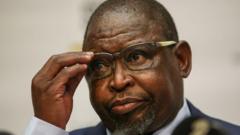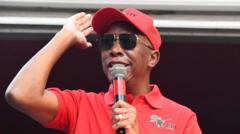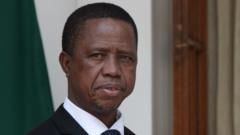South Africa's Finance Minister Enoch Godongwana has postponed the national budget unveiling after coalition partners rejected a proposal to increase the value-added tax, sending the currency tumbling. This unprecedented delay highlights ongoing governmental strife and economic challenges in the country.
South Africa's Budget Delay: Coalition Disputes Spark Economic Turmoil

South Africa's Budget Delay: Coalition Disputes Spark Economic Turmoil
Finance Minister Enoch Godongwana postpones budget presentation amid coalition tensions over proposed VAT hike, causing significant market reactions.
South Africa's Finance Minister Enoch Godongwana has faced a significant setback as he was compelled to postpone the national budget presentation due to intense disputes within the coalition government. The move came after coalition partners voiced strong opposition to Godongwana's proposed increase of the value-added tax (VAT) from 15% to 17%. The suggested hike would have inevitably raised the prices of essential goods during a time when citizens are grappling with a severe cost-of-living crisis.
Godongwana, a member of the African National Congress (ANC), found his plans derailed after the party had to enter into a coalition following a loss of its parliamentary majority in the previous elections. The postponement of the budget has sent ripples through South Africa, marking a historic moment as such a delay has not occurred since the end of apartheid in 1994. The financial markets responded unfavorably, leading to a decline in the value of the South African rand against the US dollar.
The Democratic Alliance (DA), the second-largest party in the coalition, vehemently criticized the proposed budget, emphasizing that agreeing to a VAT increase would risk further destabilizing the economy. DA leader John Stenhuisen called the proposal detrimental, asserting that it could significantly impact businesses and consumers alike. Other coalition partners, including the Freedom Front Plus, expressed discontent over the last-minute presentation of the proposed hike, claiming they were not duly informed until just before the budget was meant to be introduced.
In a follow-up statement to journalists, Godongwana indicated that discussions would continue to address the disagreements, with the new budget presentation now scheduled for 12 March. Meanwhile, opposition party the Economic Freedom Fighters (EFF) lambasted the delay, characterizing it as indicative of weak and opportunistic governance.
Conversely, the DA celebrated the postponement, framing it as a victory and pledging to advocate for a budget that better supports growth and job creation. As South Africa navigates these political and economic challenges, the implications of this budget delay will likely echo throughout the nation's economic landscape in the months to come.





















